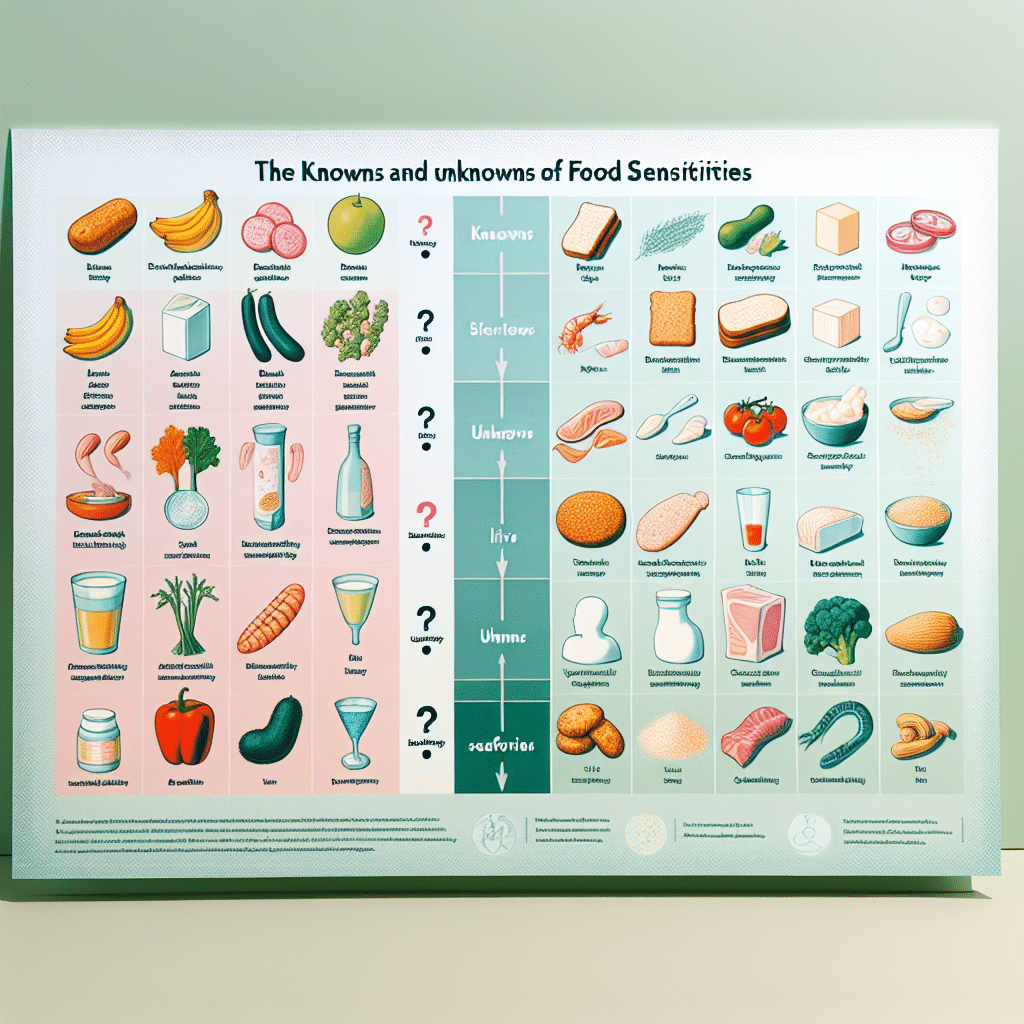The Knowns and Unknowns of Food Sensitivities
-
Table of Contents
- Food Sensitivities: Understanding the Knowns and Navigating the Unknowns
- What We Know About Food Sensitivities
- Diagnosing Food Sensitivities
- Statistics and Case Studies
- The Unknowns of Food Sensitivities
- Emerging Research and Theories
- Managing Food Sensitivities
- Conclusion: Balancing Knowledge and Uncertainty
- ETprotein: Your Partner in Managing Food Sensitivities
Food Sensitivities: Understanding the Knowns and Navigating the Unknowns

Food sensitivities are a growing concern in the modern diet, affecting an estimated 20% of the global population. Unlike food allergies, which can cause immediate and potentially life-threatening reactions, food sensitivities are often more subtle and can lead to a range of chronic health issues. Understanding the complexities of food sensitivities is crucial for individuals looking to improve their health and well-being. This article delves into the knowns and unknowns of food sensitivities, providing valuable insights backed by research, examples, and statistics.
What We Know About Food Sensitivities
Food sensitivities, also known as food intolerances, are adverse reactions to certain foods that do not involve the immune system’s IgE antibodies, which are responsible for food allergies. Instead, these reactions can be caused by various factors, including enzyme deficiencies, chemical sensitivities, and histamine intolerance.
- Enzyme Deficiencies: Lactose intolerance is a well-known example where the body lacks the enzyme lactase, needed to digest lactose found in dairy products.
- Chemical Sensitivities: Sensitivities to chemicals like additives, preservatives, and artificial colorings can trigger symptoms in susceptible individuals.
- Histamine Intolerance: Some people have difficulty breaking down histamine, a compound found in aged and fermented foods, leading to reactions.
Common symptoms of food sensitivities include gastrointestinal issues, skin rashes, headaches, fatigue, and joint pain. These symptoms can appear hours or even days after consuming the offending food, making it challenging to identify the cause.
Diagnosing Food Sensitivities
Diagnosing food sensitivities often involves an elimination diet, where suspected foods are removed from the diet for a period, then gradually reintroduced while monitoring symptoms. Healthcare providers may also use tests like the Mediator Release Test (MRT) or the ALCAT test, although these are not without controversy regarding their reliability.
Statistics and Case Studies
Research indicates that food sensitivities are on the rise. A study published in the Journal of the American Medical Association found that nearly 3.6% of Americans reported food intolerances, a significant increase from previous years. Case studies often highlight the complexity of diagnosing and managing food sensitivities, with many patients experiencing relief from chronic symptoms only after identifying and eliminating specific foods from their diet.
The Unknowns of Food Sensitivities
Despite increased awareness, there are still many unknowns surrounding food sensitivities. The mechanisms behind non-IgE-mediated reactions are not fully understood, and there is a lack of standardized testing methods. Additionally, the placebo effect and nocebo responses can complicate the perception of food sensitivities, making it difficult to discern true intolerances from psychological responses.
Emerging Research and Theories
Emerging research is exploring the role of the gut microbiome in food sensitivities, suggesting that imbalances in gut bacteria may contribute to reactions. There is also growing interest in the potential link between food sensitivities and chronic conditions like irritable bowel syndrome (IBS) and chronic fatigue syndrome (CFS).
Managing Food Sensitivities
Management of food sensitivities typically involves dietary modifications. Registered dietitians and nutritionists can provide guidance on balanced diets that eliminate trigger foods while ensuring nutritional adequacy. In some cases, supplements may be recommended to address nutrient deficiencies resulting from restricted diets.
Conclusion: Balancing Knowledge and Uncertainty
Understanding food sensitivities is a balancing act between the knowns and unknowns. While we have made strides in recognizing the impact of food sensitivities on health, much remains to be discovered about their underlying causes and best practices for diagnosis and management. Individuals dealing with food sensitivities should work closely with healthcare professionals to navigate this complex landscape and find personalized solutions that support their health and quality of life.
ETprotein: Your Partner in Managing Food Sensitivities
If you’re managing food sensitivities and looking for high-quality protein sources that are less likely to trigger reactions, ETprotein offers a range of organic bulk vegan proteins that are non-GMO and allergen-free. Their products, including Organic rice protein, pea protein, and various seed proteins, provide excellent alternatives for those with dietary restrictions. With L-(+)-Ergothioneine purity over 98%, ETprotein’s offerings cater to diverse industries and dietary needs. To explore their products and how they can support your dietary management of food sensitivities, contact ETprotein today.
About ETprotein:
ETprotein, a reputable protein and L-(+)-Ergothioneine (EGT) Chinese factory manufacturer and supplier, is renowned for producing, stocking, exporting, and delivering the highest quality organic bulk vegan proteins and L-(+)-Ergothioneine. They include Organic rice protein, clear rice protein, pea protein, clear pea protein, watermelon seed protein, pumpkin seed protein, sunflower seed protein, mung bean protein, peanut protein, and L-(+)-Ergothioneine EGT Pharmaceutical grade, L-(+)-Ergothioneine EGT food grade, L-(+)-Ergothioneine EGT cosmetic grade, L-(+)-Ergothioneine EGT reference grade and L-(+)-Ergothioneine EGT standard. Their offerings, characterized by a neutral taste, non-GMO, allergen-free attributes, with L-(+)-Ergothioneine purity over 98%, 99%, cater to a diverse range of industries. They serve nutraceutical, pharmaceutical, cosmeceutical, veterinary, as well as food and beverage finished product distributors, traders, and manufacturers across Europe, USA, Canada, Australia, Thailand, Japan, Korea, Brazil, and Chile, among others.
ETprotein specialization includes exporting and delivering tailor-made protein powder and finished nutritional supplements. Their extensive product range covers sectors like Food and Beverage, Sports Nutrition, Weight Management, Dietary Supplements, Health and Wellness Products, and Infant Formula, ensuring comprehensive solutions to meet all your protein needs.
As a trusted company by leading global food and beverage brands and Fortune 500 companies, ETprotein reinforces China’s reputation in the global arena. For more information or to sample their products, please contact them and email sales(at)ETprotein.com today.














